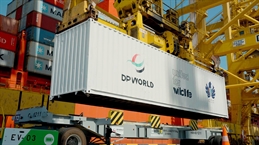
Inflation and geopolitical tensions are set to dominate concerns for the global supply chain over the next five years, according to a recent DP World study released.
"The study paints a stark picture of an industry in turbulence, with climate change and access to talent weighing heavily on business resilience and the ability to create seamless supply chains," the Emirati multinational logistics company said in the report.
DP World surveyed dozens of freight forwarders in October for the study.
"Some 63% of the respondents said Inflation is a main concern, while 56% cited geopolitical tensions as another major cause of concern," the report added, noting that this is having "major ramifications for businesses."
The DP World study also found that around 10% of the respondents said they had changed the markets they do business due to uncertainty.
"Indeed, these worries look set to dominate the thoughts of freight forwarders for years to come," DP World said, adding that some 78% said they expect geopolitical tensions and inflation to remain concerns over the next five years, with two-thirds (66%) of freight forwarders believing it is 'impossible to say' when economic disruptions will subside.
Encouragingly, many in the supply chain industry appear cautiously optimistic.
Digitalisation "biggest" efficiency driver
DP World said three-quarters (75%) of the respondents said they expect technology to be a significant factor in easing the current supply chain woes — and more than half (56%) believe digitalisation will be the single biggest driver of efficiency, reducing bottlenecks and supporting the industry going forward.
"Technology will have a considerable impact on the supply chain, with three in four saying it will lead to cost savings and a greater ability to target and deliver to new customers," the report said.
Meanwhile, DP World noted that many were unclear on how to integrate technology into their industry, with a third saying they wanted to, but simply did not know how to do it.
DP World said it is unsurprising then that half of the freight forwarders said they are further behind on their company's digital transformation journey than they had hoped.
"Global supply chains are significantly impacted by the pandemic, geopolitical tensions and the looming threat of the global climate change crisis. In fact, these challenges have demonstrated that many parts of the global supply chain infrastructure are fragile," said Sultan Ahmed Bin Sulayem, group chairman and CEO of DP World.
"These rising concerns make it imperative for logistics operators to come up with the tools and solutions that offer real-time visibility across the entire supply chain. This can allow trade routes to be fit for purpose, and thus facilitating a more seamless movement of trade around the globe," the DP World chief added.
Mike Bhaskaran, group chief operating officer, of digital technology at DP World, pointed out that the uncertainties of today's world are making trade harder and it is increasing the disconnect at various points across the whole supply chain.
Market challenges cited
"The freight forwarding community must come together to act now to mitigate risk so that we can build towards a more resilient future," Bhaskaran added, noting that the first-ever Global Freight Summit in Dubai is a step further in this direction.
The DP World report said other challenges that freight forwarders are currently experiencing include rising and unpredictable freight rates, with 80% highlighting this as the biggest worry keeping them awake at night.
The lack of financing options is also another major issue, with 37% of those surveyed saying this has a crippling effect on their ability to deliver goods.
"Interestingly, while the pandemic has disrupted every industry, including logistics, it has resulted in several positive benefits. A third of freight forwarders said it prompted a much-needed overhaul of their business, with 41% saying it has changed how they track cargo. Over half (54%) said it has increased pressure on management to operate more sustainably," the report said.



